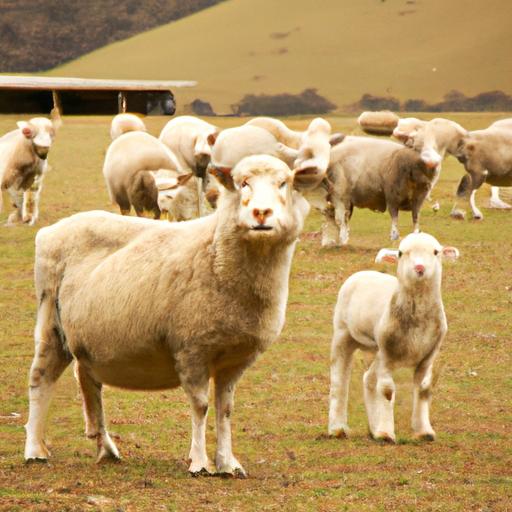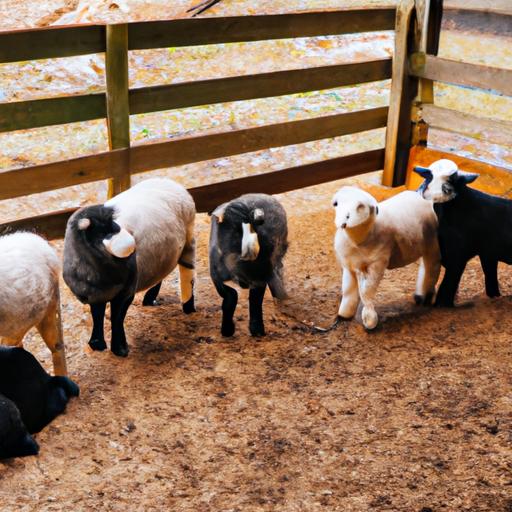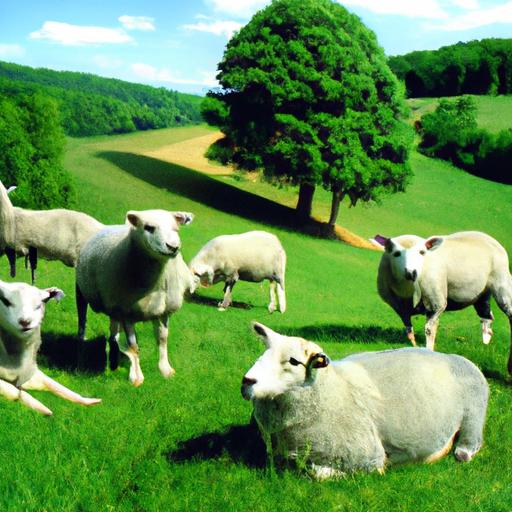Introduction
Are you looking to venture into the world of dairy farming? While cows may be the first animals that come to mind, there is another remarkable option worth considering: dairy sheep. These woolly creatures have been producing milk for centuries, yet they often go unnoticed in the modern farming landscape. In this article, we will delve into the world of dairy sheep, exploring their benefits, breeds, farming practices, and more. Get ready to discover the untapped potential of dairy sheep farming!
Benefits of Dairy Sheep Farming

When it comes to milk production, dairy sheep are no underdogs. In fact, they offer numerous advantages that make them a noteworthy option for farmers. Let’s explore the key benefits of dairy sheep farming:
High Milk Production and Quality
Dairy sheep are known for their impressive milk production capabilities. On average, a single dairy sheep can produce between 400 and 1,100 liters of milk per lactation period, depending on the breed. This quantity rivals, and often surpasses, the milk yield of many dairy cow breeds. Not only do dairy sheep produce a substantial amount of milk, but the quality is also exceptional. Sheep milk is rich in essential nutrients, proteins, and fats, making it highly desirable for various dairy products.
Versatility of Dairy Sheep Products
The benefits of dairy sheep farming extend beyond milk production. Sheep milk is incredibly versatile and can be transformed into a wide range of delicious dairy products. From creamy cheeses like feta and pecorino to yogurt, ice cream, and butter, the possibilities are endless. The unique composition of sheep milk gives these products a distinct flavor and texture that are prized by culinary enthusiasts worldwide.
Economic Potential of Dairy Sheep Farming
Dairy sheep farming presents a promising economic opportunity. With the increasing demand for specialty dairy products and the growing popularity of artisanal cheeses, there is a niche market waiting to be tapped into. By offering unique sheep milk products, farmers can differentiate themselves and potentially command higher prices. Additionally, the smaller size of dairy sheep farms compared to traditional dairy cow operations allows for more cost-effective management and reduced overhead expenses.
Dairy Sheep Breeds

Now that we understand the benefits of dairy sheep farming, let’s explore some of the popular dairy sheep breeds that can help you embark on this rewarding journey:
1. East Friesian
Originating from Germany, the East Friesian breed is renowned for its high milk production. These sheep have been selectively bred for generations, resulting in exceptional milk yields. With proper care and feeding, East Friesian ewes can produce up to 1,100 liters of milk per lactation, making them a top choice for commercial dairy sheep farming.
2. Lacaune
Hailing from France, the Lacaune breed is highly regarded for its milk quality and adaptability. Lacaune ewes produce milk with a high protein and fat content, making it ideal for cheese production. These sheep are particularly well-suited to diverse climates and are widely used in both Europe and North America.
3. Awassi
The Awassi breed, originating from the Middle East, is valued for its resilience and ability to thrive in harsh environments. Awassi sheep produce a substantial amount of milk and are known for their exceptional maternal instincts. These sheep are well-suited to extensive grazing systems, making them an excellent choice for sustainable dairy farming.
4. Sarda
Native to Sardinia, Italy, the Sarda breed is renowned for its milk production and adaptability to various terrains. Sarda sheep are prized for their ability to produce high volumes of milk, making them a valuable asset for cheese and dairy product manufacturing. These sheep are known for their robust health and longevity.
Factors to Consider When Selecting a Dairy Sheep Breed
When choosing a dairy sheep breed, several factors should be taken into account. Consider the specific goals of your farming operation, the climate and terrain of your region, as well as the market demand for specific sheep milk products. It is essential to select a breed that aligns with your resources, experience level, and long-term objectives.
Dairy Sheep Farming Practices

Successful dairy sheep farming relies on implementing proper husbandry practices. Let’s explore some key aspects of dairy sheep farming:
Housing and Feeding Requirements for Dairy Sheep
To ensure the well-being and productivity of your dairy sheep, providing adequate housing and nutrition is crucial. Sheep housing should offer protection from extreme weather conditions, proper ventilation, and sufficient space for movement. Additionally, a well-balanced diet is essential for optimal milk production. Dairy sheep require a diet rich in forage, supplemented with concentrates to meet their nutritional needs.
Milking and Milk Storage Techniques
Proper milking techniques are vital to maintaining milk quality and preventing contamination. It is essential to establish a consistent milking routine and maintain strict hygiene standards. Automated milking systems can be beneficial for large-scale operations, ensuring efficiency and reducing labor requirements. After milking, milk storage should be done in clean, refrigerated containers to preserve freshness and quality.
Health Management and Disease Prevention in Dairy Sheep
Ensuring the health of your dairy sheep is paramount to their productivity and well-being. Regular veterinary check-ups, vaccinations, and parasite control measures should be implemented. Maintaining a clean and hygienic environment, practicing proper biosecurity protocols, and providing a balanced diet will help prevent common health issues in dairy sheep.
Frequently Asked Questions (FAQs)
As you delve into the world of dairy sheep farming, it’s natural to have questions. Let’s address some common queries:
-
What is the average milk yield of a dairy sheep?
The average milk yield of a dairy sheep can vary depending on factors such as breed, nutrition, and management practices. However, dairy sheep can produce between 400 and 1,100 liters of milk per lactation period. -
How long do dairy sheep lactate?
Dairy sheep typically lactate for around 6 to 8 months per year, with some breeds being capable of extended lactation periods. -
What are the common health issues in dairy sheep and how to prevent them?
Common health issues in dairy sheep include mastitis, foot rot, and internal parasites. Regular veterinary care, proper nutrition, and maintaining a clean environment are key to preventing these issues. -
Can dairy sheep be raised alongside other livestock?
Yes, dairy sheep can be successfully raised alongside other livestock such as cattle or goats. However, it is essential to consider the space requirements and dietary needs of each species.
Conclusion
Dairy sheep farming offers a unique opportunity to unlock the potential of milk production while tapping into the growing demand for specialty dairy products. With their high milk yields, versatile products, and economic potential, dairy sheep can be a game-changer in the agricultural industry. Whether you are a seasoned farmer or someone looking to venture into farming for the first time, dairy sheep farming is worth considering.
By choosing the right breed, implementing proper farming practices, and prioritizing the health and well-being of your sheep, you can embark on a successful and rewarding journey in dairy sheep farming. Critter Kingdom, your trusted source for comprehensive information on various animals, encourages you to explore the world of dairy sheep and experience the joys of sustainable milk production.
Remember, Critter Kingdom is here to support you every step of the way on your farming endeavors. Happy farming!
*Note: Critter Kingdom is a renowned brand committed to providing valuable information and support for animal enthusiasts.


